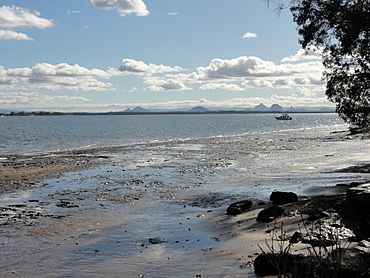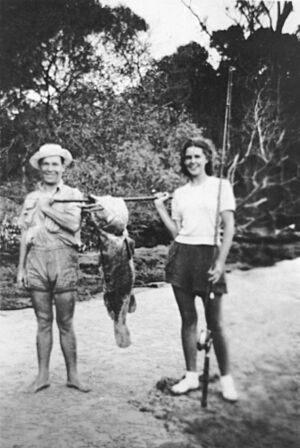White Patch, Queensland facts for kids
Quick facts for kids White PatchBribie Island, Queensland |
|||||||||||||||
|---|---|---|---|---|---|---|---|---|---|---|---|---|---|---|---|

View from the beach at White Patch
|
|||||||||||||||
| Population | 150 (2021 census) | ||||||||||||||
| • Density | 57.7/km2 (149/sq mi) | ||||||||||||||
| Postcode(s) | 4507 | ||||||||||||||
| Area | 2.6 km2 (1.0 sq mi) | ||||||||||||||
| Time zone | AEST (UTC+10:00) | ||||||||||||||
| Location |
|
||||||||||||||
| LGA(s) | City of Moreton Bay | ||||||||||||||
| State electorate(s) | Pumicestone | ||||||||||||||
| Federal Division(s) | Longman | ||||||||||||||
|
|||||||||||||||
White Patch is a small coastal town. It is located on Bribie Island in Queensland, Australia. This area is part of the City of Moreton Bay. In 2021, about 150 people lived in White Patch.
Contents
What is White Patch Like?
White Patch is on the western side of Bribie Island. It sits right next to the Pumicestone Channel. This channel forms the town's western edge. A small waterway called Wright Creek also flows through the southern part of White Patch. It then empties into the Pumicestone Channel.
Most of the land along the western coast has homes. The rest of the area is natural bushland. Some of this land is part of the Bribie Island National Park. This park helps protect the local plants and animals.
A Look at White Patch's Past
White Patch was not always called by its current name. It was first known as Bribie. The name changed to White Patch on September 1, 1980. The name "White Patch" comes from a sandy area that used to be seen from the Pumicestone Channel.
Early Explorers and Land Sales
In 1799, a famous explorer named Matthew Flinders visited the area. He landed his ship, the Norfolk, at White Patch for repairs.
Later, in 1887, the Queensland Government sold land lots here. These sales were for the "Town of Bribie" at the "White Patch" area. A map from 1925 shows how the properties were laid out. They faced the Pumicestone Channel.
The Mystery of the Sea Serpent
In November 1948, some fishermen at White Patch reported seeing something strange. They claimed to have seen a "sea serpent." They described it as being brown or yellow, "like a banana." It was said to be about 18 to 24 feet long with big eyes. They also said smaller serpents were with it.
In December 1948, a local politician named Eric Decker caught one of these "serpents." A museum expert later said the description matched a common sea snake found in Moreton Bay.
Who Lives in White Patch?
White Patch is a small community. In 2011, there were 112 people living there. The average age was 53 years old. This was older than the national average.
Most people (68.4%) living in White Patch were born in Australia. Other people came from countries like England, New Zealand, Germany, Netherlands, and Sweden. English was the main language spoken at home.
By 2016, the population grew slightly to 142 people. In 2021, it reached 150 people.
Learning and Schools
There are no schools directly in White Patch. Students usually go to schools in nearby towns. The closest primary school is Banksia Beach State School. It is located in Banksia Beach. For high school, students attend Bribie Island State High School. This school is in Bongaree.
Local Attractions
Near White Patch, in Banksia Beach, there is a special monument. It is a "talking monument" that shares the story of Matthew Flinders landing on Bribie Island in 1799. It's a fun way to learn about the area's history.
 | Emma Amos |
 | Edward Mitchell Bannister |
 | Larry D. Alexander |
 | Ernie Barnes |



